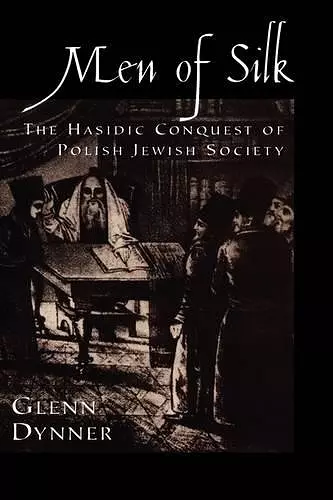Men of Silk
The Hasidic Conquest of Polish Jewish Society
Format:Hardback
Publisher:Oxford University Press Inc
Published:18th May '06
Currently unavailable, and unfortunately no date known when it will be back
This hardback is available in another edition too:
- Paperback£47.49(9780195382655)

Hasidism is a Kabbalah-inspired Jewish spiritual revival that centers on charismatic leaders and miracle workers known as "Zaddikim." By the beginning of the 19th century, Zaddikim and their devotees had forged Hasidism into a movement of such power and scop that it had dramatically altered the spiritual, cultural, and social timbre of Jewish communities across Eastern and East Central Europe. Glenn Dynner provides a first critical look at Hasidism's stunning transformation into a mass movement by highlighting the variegated region of Central Poland. His research shatters prevailing romantic notions about Hasidism during its meteoric rise, revealing Polish Zaddikim as shrewd populists who cultivated folksy images and achieved immense grassroots appeal, and yet proved equally adept at securing elite support, neutralizing powerful opponents, and seizing control of Jewish communal institutions across Central Poland.
Dynner's book represents an important contribution to the previously understudied historiography of nineteenth-century Hasidism. His thorough and careful archival research, combined with his nuanced analysis of important zadikim, their ideology, and their social power, sets a new standard for the study of Hasidism. This is an indispensable volume for scholars and enthusiastic students of nineteenth-century East European Jewish culture and society. * American Historical Review *
Men of Silk is an original research study which contextualizes the emergence of Hasidism as a wide ranging popular movement taking place throughout central Poland between the years 1754 and 1830. The book presents recently discovered archival material from Poland pertaining to the social and cultural aspects of the Hasidic movement and introduces new questions concerning the internal and external dimensions of the development of Hasidism. The author contributes to a better understanding of the challenge offered to the social historian in the presentation of Hasidic Jewry in its social and political context, while not losing insight into inner Jewish life. * Rachel Elior, author of The Mystical Origins of Hasidism *
With precision and learning, Glenn Dynner manages to cut through so much of the multi-layered mythology surrounding the etiology, the organization, and the spread of hasidism in Poland. He provides a new, lucid account of its leaders, the lives of its devotees, and its relationship with government and Jewish society. He extracts much historical insight from seemingly recalcitrant hasidic hagiography, and draws on the widest range of sources -- hasidic, anti-hasidic, travelers' accounts, official, and more -- in what is a fascinating, fresh account of one of the most resonant Jewish religious ideologies in modern times. * Steven J. Zipperstein, author of Imagining Russian Jewry: Memory, History, Identity *
The story of Hasidism has been told by both fervent believers and sworn secularists. This great east-European religious movement stood for several generations in the center of modern Jewish Historiography, and yet its diverse nature has been reduced to fit changing cultural modes, as well as long-forgotten political agendas. Men of Silk revises the story of Polish Hasidism. It offers a critical reading of inside and outside contemporaneous sources. Dynner's careful reading of the texts reveals Hasidism as a complex historical phenomenon, quite different from the simplistic portrait drawn by earlier schools of Jewish historians. * Israel Bartal, author of The Jews of Eastern Europe, 1772-1881 *
Dynner's book addresses the heretofore neglected but crucially important subject of 19th-century Hasidism, shedding much light on this vital chapter of Jewish (and Polish) history. * Gershon David Hundert, author of Jews in Poland-Lithuania in the Eighteenth Century: A Genealogy of Modernity *
- Commended for National Jewish Book Award (Eastern European Studies) 2006
ISBN: 9780195175226
Dimensions: 162mm x 236mm x 32mm
Weight: 717g
396 pages